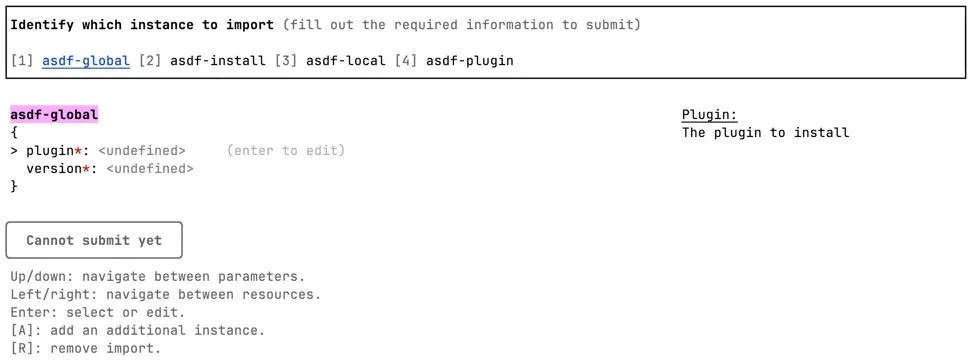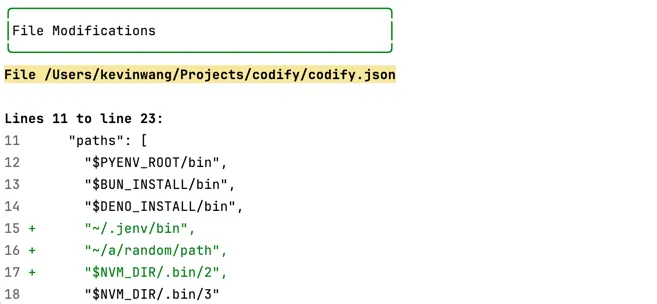Import
codify import <type> [type...][--json][--debug][-o plain|default|debug|json][-s][-p <value>]Use codify import to generate JSON configs based on what is currently installed on the system.
The import command imports actually installed programs and settings back into Codify configs.
Use cases:
-
Getting started: import resources into Codify to get started so that the configs don’t need to be written by hand. Specify the resources to import into codify
codify import homebrew nvmor all all supported resourcescodify import *. -
Keeping existing files update: import new changes on the system that were made external to Codify. Run the command
codify importin a folder with acodify.jsoncfile without any arguments. A diff will be shown of all the changes that will be made to the existing file.
Multiple instances:

If a resource can support multiple instances on the system like for example git-clone, path or alias.
Codify will prompt the user for identifying information so that a specific instance of that
resource will be imported. For git-clone, this will be the path of the directory to import. A prompt
will be shown that collects this information. There are shortcut keys to remove an import or add
additional ones.
Diff:

Users with an existing Codify file will have the option to update an existing Codify file or write it to a new file. If an existing file is chosen, then Codify will try to insert new changes with the same formatting as the existing file (same spacing and formatting). A diff will be shown to the user of any changes it will make to the existing file.
Arguments
<type>: The type id of the resources to import. Multiple ids separated by spaces
can be specified. Wildcards * and ? can be used to match multiple types at once. To match
all resources supported by Codify, use codify import *.
No arguments can also be specified, which will update an existing codify.jsonc file with any new
changes on the system. For example, if additional formulas for homebrew were installed outside of
Codify, then codify import will add the new formulas to your existing config.
Options
Path: —path -p
Specify the path for the codify.jsonc file. This parameter accepts both relative and absolute paths.
Output mode: —output -o
Specify the CLI output mode. Options: [default, plain, json]. The output mode controls what gets
printed to the console.
Debug output mode: —debug
A flag to enable debug mode. In debug mode, the debug output will be turned on and the DEBUG=codify flag
will be passed to all plugins. Additional and verbose logging will be printed. Useful for debugging
any issues.
Secure mode: —secure -s
Activates secure mode which sandboxes all plugins and prevents them from using sudo unless explictly
permitted by the user. This is done by launching the plugins as a separate processes without TTY access.
Secure mode is automatically turned on if an unverified plugin is used.
Examples
codify import homebrew nvm vscode
codify import *
codify import asdf*
codify import